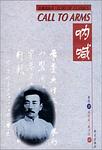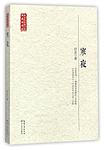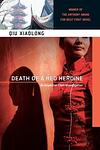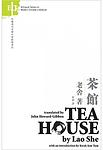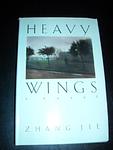The Greatest Hungarian, Chinese "Fiction" Books Since 1900
Click to learn how this list is calculated.
This list represents a comprehensive and trusted collection of the greatest books. Developed through a specialized algorithm, it brings together 300 'best of' book lists to form a definitive guide to the world's most acclaimed books. For those interested in how these books are chosen, additional details can be found on the rankings page.
Genres
Countries
Date Range
Reading Statistics
Click the button below to see how many of these books you've read!
Download
If you're interested in downloading this list as a CSV file for use in a spreadsheet application, you can easily do so by clicking the button below. Please note that to ensure a manageable file size and faster download, the CSV will include details for only the first 500 books.
Download-
1. Call to Arms by Xun Lu
"Call to Arms" is a collection of short stories that vividly capture the impact of the socio-political upheaval during the early 20th century in China. The narratives delve into the lives of ordinary people, predominantly the peasantry and the lower classes, who are often caught in the throes of societal change and struggle for survival. Through a blend of realism and symbolism, the stories explore themes of tradition versus modernity, the human condition, and the quest for justice, reflecting the author's critical engagement with the national and cultural issues of his time.
-
2. Fateless by Imre Kertész
"Fateless" is a harrowing account of a Hungarian Jewish boy's experiences in Nazi concentration camps during World War II. The protagonist is sent to Auschwitz, then Buchenwald, and finally to a factory in Zeitz, enduring brutal conditions and witnessing unimaginable horrors. Despite his experiences, he maintains a detached, almost indifferent perspective, focusing on the mundane aspects of life in the camps, which further highlights the absurdity and horror of the situation. The novel explores themes of identity, survival, and the arbitrary nature of fate.
-
3. Embers by Sandor Marai
"Embers" is a novel about two old friends who reunite after being apart for 41 years. The story takes place in a secluded castle in the Carpathian Mountains, where the two men confront each other about a long-kept secret that has kept them apart. The narrative delves into themes of friendship, love, loyalty, and betrayal, while exploring the intricate dynamics of human relationships. The novel is a poignant examination of the nature of time and memory, and the ways in which they can shape and define our lives.
-
4. The Notebook: The Proof ; The Third Lie : Three Novels by Agota Kristof
"The Notebook: The Proof ; The Third Lie : Three Novels" is a trilogy of novels that follow the lives of twin brothers, living through the harsh realities of war, separation, and betrayal. The first novel, "The Notebook," tells the story of their survival as children in a rural town at the end of World War II. The second book, "The Proof," continues their story into adulthood, exploring the effects of their traumatic childhood. The final book, "The Third Lie," delves into the complexities of their relationship and the secrets they kept from one another. The trilogy is a poignant exploration of identity, love, and the enduring bond of brotherhood.
-
5. Journey by Moonlight by Antal Szerb
"Journey by Moonlight" tells the story of a newlywed Hungarian couple, Mihály and Erzsi, who honeymoon in Italy. Mihály, however, is haunted by his past and becomes increasingly obsessed with his adolescent years, his old friends, and a mysterious brother and sister. This results in him abandoning Erzsi in order to embark on a strange and dark journey of self-discovery. The novel explores themes of nostalgia, love, and the struggle between personal desires and societal expectations.
-
6. Rickshaw Boy by Lao She
"Rickshaw Boy" is a novel about a young man living in Beijing in the 1920s who struggles to escape poverty and achieve personal independence. Despite his hard work and determination, he is continuously set back by societal and personal misfortunes, including failed business ventures, a disastrous marriage, and the loss of his rickshaw. The book serves as a critique of traditional Chinese society, illustrating the harsh realities of life for the working class during this time period.
-
7. Waiting by Ha Jin
"Waiting" is a story set in China during the Cultural Revolution and its aftermath, revolving around the life of Lin Kong, a military doctor who is torn between his love for two women. He is stuck in an arranged marriage with his traditional wife in the countryside, while he falls in love with a modern, city nurse. The novel explores his 18-year struggle to divorce his wife and marry his lover, depicting the clash between traditional and modern Chinese culture, personal desires, and societal expectations.
-
8. Édes Anna by Dezső Kosztolányi
"Édes Anna" is a novel that revolves around the life of a young servant girl, Anna, who works for a bourgeois family in early 20th century Hungary. The narrative explores Anna's experiences of exploitation, abuse, and societal oppression. As she navigates her way through life, her innocence and naivety are gradually eroded, leading her to commit an act of violent rebellion. The book is a potent critique of class and gender inequalities of the time.
-
9. Balzac and the Little Chinese Seamstress by Dai Sijie
This novel tells the story of two teenage boys sent to a remote mountain village for re-education during China's Cultural Revolution. There, they meet a local tailor's daughter, who becomes their friend and the object of their shared affection. The boys discover a hidden suitcase filled with forbidden Western classics in Chinese translation, and their lives are forever changed. The books not only awaken their passion for literature, but also allow them to educate the Seamstress, ultimately leading to a heartbreaking love triangle and a tale of personal freedom against the odds.
-
10. The Three-Body Problem by Cixin Liu
The book is a science fiction novel that intertwines the cultural revolution of China with a complex narrative involving astrophysics, virtual reality, and alien contact. It follows a disillusioned scientist who, after suffering personal tragedy during the Cultural Revolution, sends a message into space, only to receive a response from an alien civilization on the brink of destruction. As the aliens plan their migration to Earth, a secret organization works to facilitate the invasion, while a disparate group of scientists and military personnel attempt to understand and prevent the impending extraterrestrial crisis. The novel grapples with themes of human nature, technological advancement, and the vast, often incomprehensible universe.
-
11. Celestial Harmonies by Peter Esterhazy
"Celestial Harmonies" is a historical novel that tells the story of the aristocratic Esterházy family, tracing their lineage from the late Middle Ages to the present day. The narrative is divided into two parts, with the first part featuring a series of vignettes about the family's ancestors, while the second part focuses on the experiences of the narrator's father under the Communist regime in Hungary. The novel is characterized by its intricate structure, complex themes, and lush, poetic language, offering a rich exploration of Hungarian history, family dynamics, and the human condition.
-
12. The Door by Szabó, Magda
"The Door" by Magda Szabo is a novel about the relationship between two women, one of whom is a writer and the other is her housekeeper. The story explores themes of class, power, and the complexities of human relationships. As the two women become increasingly intertwined, their relationship becomes more and more complicated, leading to unexpected consequences for both of them. The novel is a powerful exploration of the human condition, and a poignant reminder of the importance of understanding and empathy in our interactions with others.
-
13. The Case Worker by György Konrád
"The Case Worker" is a novel that follows the life of a young, disillusioned social worker in Hungary who is struggling with the grim realities of his job. He is constantly faced with the harsh and desperate situations of his clients, which include the poor, the mentally ill, and the elderly. As he tries to help them, he becomes increasingly aware of the bureaucratic and social systems that often hinder rather than aid these vulnerable individuals. This leads him to question the effectiveness of his role and the larger societal structures in place.
-
14. Cold Nights by Ba Jin
"Cold Nights" is a poignant love story set in the backdrop of China's turbulent political climate during the 1940s. The narrative follows the protagonist, Wan Da, as he navigates through the hardships of life, love, illness, and death. As his wife, Zhenzhen, falls ill with tuberculosis, Wan Da's struggle to secure medical help for her amidst the chaos of war paints a vivid picture of human endurance and the power of love. The book also explores themes of existentialism and the human condition, offering a profound look at life's hardships and the strength of the human spirit.
-
15. Death Of A Red Heroine by Qiu Xiaolong
"Death Of A Red Heroine" is a crime novel set in 1990s Shanghai, China. The story follows Inspector Chen Cao as he investigates the murder of a young woman, whose body is found in a canal. As Chen delves deeper into the case, he uncovers a web of corruption, political intrigue, and personal secrets that challenge his loyalty to the Communist Party and force him to confront the complexities of modern Chinese society. Through vivid descriptions of Shanghai's changing landscape and insightful commentary on social issues, the novel offers a captivating portrayal of a country in transition.
-
16. Teahouse by Lao She
"Teahouse" is a historical drama that explores 50 years of Chinese history (1898-1948) through the microcosm of a Beijing teahouse. The narrative follows the lives of the teahouse owner and his customers, reflecting the social changes, political turmoil, and cultural shifts of the time. The story provides a deep insight into the Chinese society, its traditions, and the impact of Western influence. It also highlights the struggle of the common people amidst corruption, oppression, and the collapse of traditional values.
-
17. A Hero Born by Jin Yong
"A Hero Born" is the first installment in an epic martial arts saga set in the Song Dynasty of China, where the story follows the life of Guo Jing, a young boy from a humble background. After his father, a loyal Song patriot, is murdered, Guo Jing is raised by Genghis Khan in the Mongolian steppes. Throughout his adventures, he encounters a diverse cast of characters, learns from legendary martial arts masters, and is imbued with the values of honor, loyalty, and the complex moralities of warfare and brotherhood. His destiny is intertwined with the fate of his nation as he embarks on a quest to become a true hero and to confront formidable enemies that threaten the very fabric of the martial arts world.
-
18. Heavy Wings by Zhang Jie
"Heavy Wings" is a novel that explores the societal changes in China during the late 20th century. It follows the story of a group of innovative engineers striving to design and build China's first large-scale commercial aircraft. Despite facing numerous challenges such as lack of resources, political interference, and personal struggles, they remain committed to their mission, symbolizing the spirit of perseverance and innovation. The story is a reflection of China's journey towards modernization and technological advancement.
-
19. Epepe by Ferenc Karinthy
The book revolves around a linguist who finds himself inexplicably trapped in a nightmarish city where he cannot understand the language or communicate with the inhabitants. Despite his expertise in languages, the protagonist's skills are rendered useless in this alien environment, leading to a series of Kafkaesque encounters as he desperately tries to make sense of his surroundings and find a way back home. His isolation is compounded by the city's indifferent bureaucracy and the strange, often absurd, customs of its citizens, turning his ordeal into an existential struggle for identity and understanding in the face of an incomprehensible world.
-
20. Half of Man is Woman by Zhang Xianliang
This novel provides a deeply personal account of the author's experiences during China's Cultural Revolution and his subsequent imprisonment in a labor camp. The protagonist struggles with the harsh realities of his imprisonment, including starvation and physical abuse, while also grappling with his own identity and the societal expectations of masculinity. His release and subsequent marriage only further complicate his quest for self-understanding, as he navigates the challenges of reintegrating into society and maintaining a relationship with a woman who has her own traumatic past.
-
21. Cat Country by Lao She
This novel is a satirical science fiction tale that transports the reader to Mars, where the protagonist, a Chinese man, finds himself stranded in a society inhabited by cat-like humanoids. The narrative delves into the peculiarities and dysfunctions of this Martian civilization, known as Cat Country, highlighting its inhabitants' indolence, corruption, and societal decay. Through the lens of this alien society, the author critiques various aspects of early 20th-century Chinese society, politics, and culture, using the allegorical Cat Country to reflect on human follies, the dangers of political apathy, and the consequences of societal neglect. The story is both a unique exploration of extraterrestrial life and a poignant commentary on the human condition.
-
22. The Melancholy of Resistance by László Krasznahorkai
"The Melancholy of Resistance" is a surreal and philosophical novel set in a small Hungarian town that becomes isolated by a massive snowstorm. The arrival of a mysterious circus, featuring a stuffed whale and a silent, enigmatic leader, brings with it a wave of change and unrest. The narrative explores themes of chaos, resistance, and the struggle for power through the perspectives of various townsfolk, including a reclusive music theorist and a former political dissident. The novel is known for its complex, long-winded sentences and its bleak yet profound examination of human nature and society.
-
23. Miss Sophie's Diary And Other Stories by Ding Ling
This collection of stories offers a poignant glimpse into the lives of Chinese women in the early 20th century, grappling with issues of personal freedom, gender roles, and societal expectations. The titular story, written in diary form, provides an intimate look at the emotional turmoil of a young woman confronting her own desires and the constraints placed upon her by traditional norms. The other narratives in the collection similarly explore the inner lives and struggles of women seeking to define themselves in a rapidly changing world, often touching on themes of love, independence, and self-discovery. Through these stories, the book paints a vivid portrait of the complexities of modern womanhood in a society in transition.
-
24. Love In A Fallen City by Eileen Chang
"Love in a Fallen City" is a collection of novellas and short stories that delve into the complexities of love, betrayal, and societal expectations in mid-20th century China. The stories primarily focus on women navigating the challenging terrain of romance and marriage in a rapidly changing society. The titular story captures the tumultuous relationship between a divorced woman and a playboy against the backdrop of World War II, exploring themes of survival, traditional values, and personal transformation. Through elegant prose and deep psychological insight, the book portrays the collision of Eastern and Western cultures and the personal struggles of individuals caught in the throes of historical upheaval.
-
25. My City: A Hong Kong Story by Xi Xi
"My City: A Hong Kong Story" is a compelling narrative that provides an intimate exploration of Hong Kong through the author's eyes. The author weaves a rich tapestry of the city's unique culture, history, and identity, drawing on personal experiences, observations, and a deep love for the city. The book is a poignant tribute to Hong Kong, presenting the city's transformation over the years and the challenges it faces, while also highlighting its resilience and spirit.
Reading Statistics
Click the button below to see how many of these books you've read!
Download
If you're interested in downloading this list as a CSV file for use in a spreadsheet application, you can easily do so by clicking the button below. Please note that to ensure a manageable file size and faster download, the CSV will include details for only the first 500 books.
Download